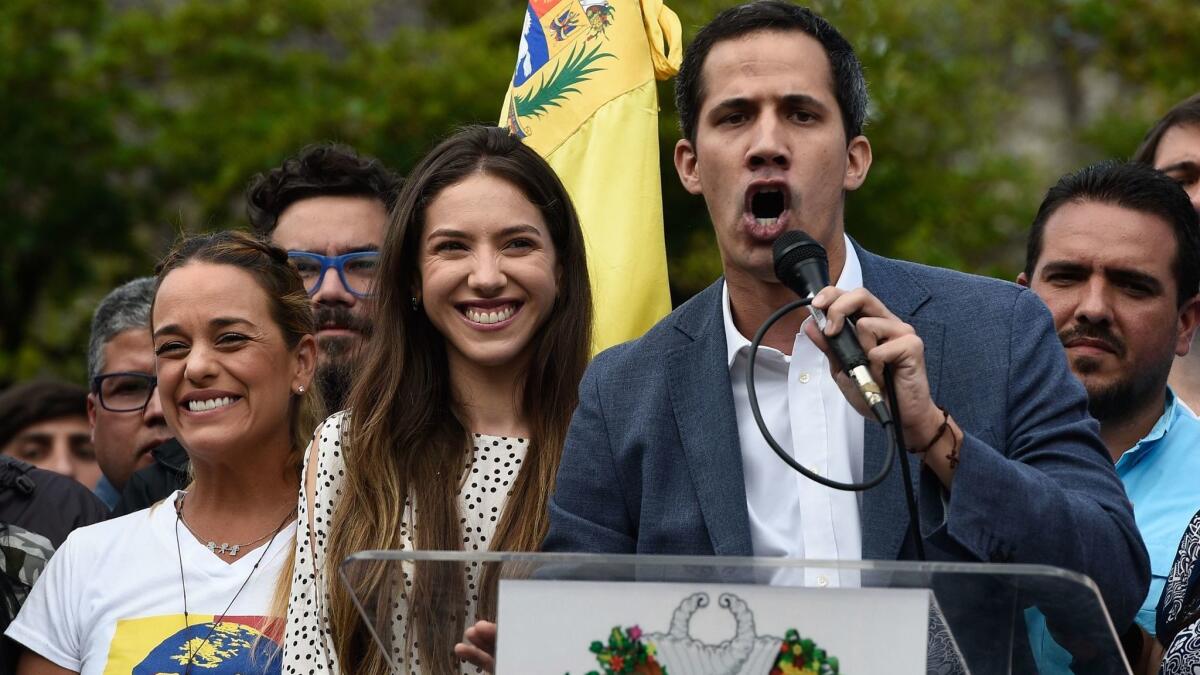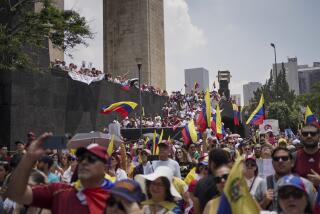Juan Guaido, Venezuela’s self-proclaimed president, thanks supporters and international backers

Reporting from Caracas, Venezuela — Venezuela’s self-proclaimed acting president, Juan Guaido, expressed thanks at a Saturday rally for growing international support in his bid to take control of the government, promising not to abandon his effort to chase President Nicolas Maduro from office.
About 2,000 followers showed up for the gathering in the affluent Las Mercedes neighborhood of Caracas, the capital, where Guaido paid special thanks to the United Kingdom which, he said, has refused to turn over $1.2 billion in gold to the Maduro government.
“The decision of the Bank of England to not return gold to the usurpers is the beginning of the protection of Venezuelan assets,” Guaido said. “We are not going to permit more abuses and that they rob the money, food and medicines of Venezuelans ….The [gold] does not belong to the government, it should be used to attend to the health and feeding of Venezuelans.”
Guaido, 35, who became president of the National Assembly earlier this month, proclaimed himself interim head of state at a massive rally in Caracas on Wednesday. He declared Maduro to be an illegitimate leader and contended that Maduro’s reelection last May was rigged. He also is demanding the formation of a transitional government and that new elections be held quickly.
Dozens of countries, including the United States, most South American countries and some members of the European Union, have expressed support for Guaido and called on Maduro to step down. Venezuelans are suffering from a host of hardships, including hyperinflation, food scarcities and high crime, that have forced hundreds of thousands to leave the country in search of better lives.
Also on Saturday, Guaido acknowledged reports that leaders of several European countries were pressuring Maduro to hold new elections within days. At a special U.N. Security Council meeting Saturday, Maduro’s foreign minister Jorge Arreaza rejected the demand, telling the governments of Spain, France and Germany to mind their own business.
“Europe is giving us eight days to do what? From where do you get the power to give a sovereign nation orders or an ultimatum? … Take care of your own affairs. Respect the self-determination of countries,” Arreaza said.
In addition to reiterating demands that Maduro resign, the rally in Caracas was called to take an informal vote among those present on a proposed amnesty law that Guaido has promoted in the National Assembly. It would exonerate police and military who support the opposition’s “restitution of democracy” while forcing the release of political prisoners.
The majority of those attending raised their hands in favor of the legislation, which has not yet been passed by the assembly. According to the civil society group Penal Forum in Caracas, Maduro is holding 281 political prisoners.
The immediate impact of an amnesty law is doubtful since a rival constitutional assembly Maduro formed in 2017 has taken over powers claimed by the freely elected National Assembly headed by Guaido. On Tuesday, Maduro’s constitutional assembly declared null and void all legislative acts by the National Assembly, including Guaido’s designation as president.
Attendees at the Guaido rally said they had come to voice their support for the amnesty law, the removal of Maduro and for Guaido as a new leader.
“Many people have been imprisoned for purely political reasons and have been treated very badly, so this amnesty law is important,” said business manager Carlos Rodriguez, 65.
Agricultural engineer Andras Von Fedak, 54, said a change is necessary for Venezuela because “authoritarianism doesn’t work.”
“To give you an example, agricultural production is down 80% since the chavistas took power,” said Von Fedak, referring to 1999 when Maduro’s socialist predecessor Hugo Chavez was inaugurated. “The monthly minimum wage in dollars was $350, Now it’s $20. There were 14,000 industries in Venezuela then, now there are 3,000 and one third of them have said they expect to close this year.”
Maria Virginia Aldana, a 27-year-old political science teacher, said she supports Guaido partly because his is a “new face. He’s not one of these old guys that have been there forever and want to control everything. The timing for change is perfect.”
Mogollon is a special correspondent.
More to Read
Sign up for Essential California
The most important California stories and recommendations in your inbox every morning.
You may occasionally receive promotional content from the Los Angeles Times.










